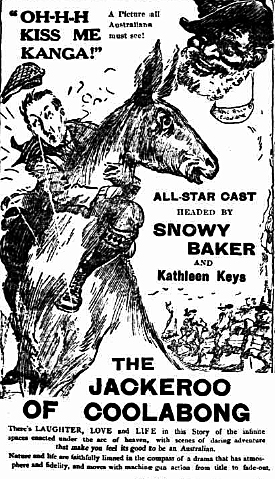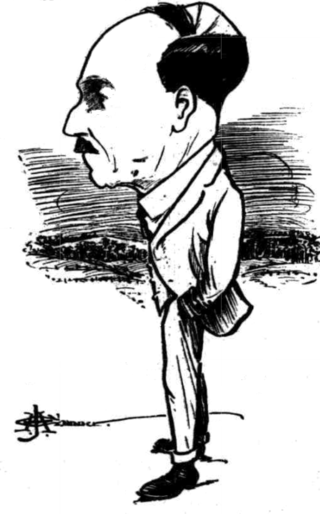Related Research Articles

Thunderbolt is a 1910 Australian feature film based on the life of the bushranger Captain Thunderbolt. It was the directorial debut of John Gavin who later claimed it was the first "four-reel movie" made in Australia. It has also been called the first film made in New South Wales.

The Man from Snowy River is a 1920 film made in Australia. The film was silent and filmed in black and white, and was based on the Banjo Paterson poem of the same name.

The Blue Mountains Mystery is a lost 1921 Australian silent film directed by Raymond Longford and co-directed by Lottie Lyell.
Frank Beaumont "Beau" Smith, was an Australian film director, producer and exhibitor, best known for making low-budget comedies.

The Assigned Servant, or the Life Story of a Deported Convict is a 1911 Australian silent film about a convict who is transported to Van Diemen's Land. It was made by the husband-and-wife team of John and Agnes Gavin and is considered a lost film.

Keane of Kalgoorlie, or a Story of the Sydney Cup is a 1911 Australian silent film set in the racing and gambling circles of Sydney, based on a popular play by Edward William O'Sullivan and Arthur Wright, adapted from the novel by Wright.

Our Friends, the Hayseeds is a 1917 Australian rural comedy from director Beaumont Smith. It centers on the rural family, the Hayseeds, and their rivalry with a neighbouring family, the Duggans.

The Betrayer is a 1921 Australian-New Zealand lost film from director Beaumont Smith about an interracial romance between a white Australian man and a Māori girl.
The Dinkum Bloke is a 1923 Australian silent film directed by Raymond Longford. Despite the title and the presence of Arthur Tauchert and Lottie Lyell in the cast, the film is not a direct sequel to The Sentimental Bloke (1919) or Ginger Mick (1920).

Sunrise is a 1926 Australian silent film co-directed by Raymond Longford, who took over during filming.

The Jackeroo of Coolabong is a 1920 Australian silent film starring renowned Australian sportsman Snowy Baker. It was the last of three films he made with the husband and wife team of director Wilfred Lucas and writer Bess Meredyth, both of whom had been imported from Hollywood.
Walter Franklyn Barrett, better known as Franklyn Barrett, was an Australian film director and cinematographer. He worked for a number of years for West's Pictures. It was later written of the filmmaker that "Barrett's visual ingenuity was to be the highlight of all his work, but... his direction of actors was less assured".
The Mystery of the Black Pearl is a 1912 Australian silent film. A detective drama, It is now considered a lost film.
The Eleventh Hour is a 1912 Australian silent film. It is considered a lost film.
A Silent Witness is a 1912 Australian silent film directed by Franklyn Barrett. It is considered a lost film. It was a drama set in Sydney with Cyril Mackay as the hero.

Lacey Percival was an Australian cinematographer who worked on many early Australian silent films. He worked for the Australian Photo-Play Company then joined West's Pictures. When that company merged with Australasian Films he ran their weekly newsreel, Australasian Gazette until 1925.

Dope is a 1924 Australian silent film about a respected citizen who is blackmailed by someone from his past. It is considered a lost film.

The Life Story of John Lee, or the Man They Could Not Hang is a 1912 Australian silent film based on a stage play about the true life story of John Babbacombe Lee.

The Life Story of John Lee, or the Man They Could Not Hang is a 1921 Australian silent film based on the true life story of John "Babbacombe Lee. It is a remake of a 1912 film with some extra scenes of Lee's childhood.

Edward Julius was Conservator of Forests for South Australia from 1924 until 1935.
References
- ↑ "The Screen". Everyones. Sydney: Everyones Ltd. 26 May 1920. Retrieved 26 April 2024– via Trove.
- ↑ "Comedy and tragedy". The Bulletin. Sydney, N.S.W.: John Haynes and J.F. Archibald. 26 July 1923. Retrieved 26 April 2024– via Trove.
- ↑ ""THE CURTAIN" A Tribute to Cyril Mackay". The Evening Journal. Vol. LVIII, no. 16181. South Australia. 14 July 1923. p. 7. Retrieved 26 April 2024– via Trove.
- "The late Cyril Mackay". Everyones. Sydney: Everyones Ltd. 18 July 1923. Retrieved 26 April 2024– via Trove. - ↑ "Cvrii Mackay in Films". The Sunday Times . No. 1806. New South Wales, Australia. 5 September 1920. p. 26. Retrieved 24 July 2019– via Trove.
- ↑ "THE PLAY AND OTHERWISE Sydney Shows". Everyones. Sydney: Everyones Ltd. 8 September 1920. Retrieved 26 April 2024– via Trove.
- "CYRIL MACKAY BENEFIT". The Sydney Morning Herald . No. 25, 797. New South Wales, Australia. 9 September 1920. p. 4. Retrieved 26 April 2024– via Trove. - ↑ "MR. CYRIL MACKAY". The Week . Vol. XCVI, no. 2, 482. Queensland, Australia. 20 July 1923. p. 9. Retrieved 26 April 2024– via Trove.
- "THE LATE CYRIL MACKAY". The Daily Mail. No. 7. Queensland, Australia. 15 July 1923. p. 10. Retrieved 26 April 2024– via Trove. - ↑ "Cyril Mackay". Table Talk . No. 1472. Victoria, Australia. 9 October 1913. p. 18. Retrieved 26 April 2024– via Trove.
- ↑ "CYRIL MACKAY". Critic. Vol. XVII, no. 967. South Australia. 23 August 1916. p. 15. Retrieved 26 April 2024– via Trove.
- ↑ ""THE USUAL THREE."". The Register . Vol. LXXXVII, no. 25, 553. Adelaide, South Australia. 20 November 1922. p. 8. Retrieved 26 April 2024– via Trove.